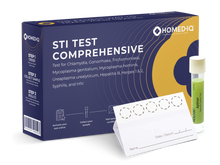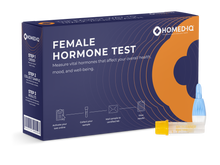Leaky gut: what happens with a permeable intestine
Leaky gut, also known as "intestinal permeability," refers to a condition in which the intestinal wall no longer performs its barrier function optimally.
This may allow harmful substances such as toxins and bacteria to more easily enter the bloodstream. A leaky gut can be triggered by several factors, including an unhealthy diet, chronic stress, and certain medical conditions. This condition can promote inflammation in the body and has been linked to a range of health problems.
Table of Contents
- What does “leaky gut” mean?
- What is the role of the intestinal barrier in leaky gut?
- What causes leaky gut?
- What are the symptoms of leaky gut?
- What other conditions are associated with leaky gut?
- How is leaky gut diagnosed?
- How is leaky gut treated?
What does “leaky gut” mean?
The term “leaky gut” refers to a condition in which the intestinal barrier—a protective lining in the digestive tract—no longer functions properly. Under normal conditions, this barrier regulates the transport of nutrients and other substances from the gut into the bloodstream, while blocking potentially harmful elements such as toxins or bacteria. In a leaky gut, this barrier is compromised, allowing unwanted substances to enter the bloodstream more easily.
The term “leaky gut syndrome,” on the other hand, refers to a theoretical or suspected medical condition in which this increased intestinal permeability is believed to cause various symptoms and health issues. In other words, it suggests a causal relationship between a compromised gut barrier and clinical symptoms. However, leaky gut syndrome is not currently recognized as an official medical diagnosis (Cleveland Clinic, 2022).
What is the role of the intestinal barrier in leaky gut?
The human intestinal barrier acts as a shield against harmful substances while allowing the absorption of essential nutrients such as vitamins and minerals. This barrier consists of tightly packed cells connected by specialized proteins known as tight junctions. The protein zonulin plays a central role here by regulating the opening and closing of these tight junctions. Elevated levels of zonulin may increase intestinal permeability, allowing harmful substances to enter the body more easily.
Our gut is also home to a large portion of our immune system—about 70–80% of the body’s immune cells are located here. When the intestinal barrier is disrupted, toxins, bacteria, and undigested food particles can pass into the bloodstream. This triggers immune system activation and promotes inflammation, which can lead to a range of health issues over time (Paray et al., 2020). Additionally, the gut microbiome, consisting of trillions of beneficial organisms such as bacteria, supports the gut's health and function. A healthy balance of these organisms and an intact intestinal barrier are therefore essential for overall health.
What causes leaky gut?
The health and integrity of the intestinal barrier are critical to overall well-being. Leaky gut can lead to a wide range of health problems, which is why it’s important to understand the key contributing factors:
- Dysbiosis: An imbalance in the gut microbiota can disrupt tight cellular connections, allowing pathogens and toxins to enter and cause inflammation and tissue damage.
- Diet: Nutrition plays a key role in maintaining the balance of gut microbiota and the integrity of the gut barrier. A diet high in fat and processed carbohydrates can contribute to increased intestinal permeability.
- Stress: Both acute and chronic stress may impair the development and maintenance of the gut barrier and is associated with increased intestinal permeability.
Infections (such as Helicobacter pylori), excessive alcohol consumption, and certain medications have also been linked to increased gut permeability (Paray et al., 2020).
What are the symptoms of leaky gut?
Common symptoms associated with leaky gut include:
- Digestive problems such as bloating, gas, diarrhea, or constipation
- Chronic fatigue or exhaustion
- Skin issues such as eczema or acne
- Joint pain or rheumatic complaints
- Chronic headaches or migraines
- Difficulty concentrating or memory problems
Many of these symptoms are non-specific and can also be related to other conditions (Cleveland Clinic, 2022).
Would you like to assess your own health?
Early detection and treatment of health problems is key to preventing long-term complications and improving quality of life. A disrupted gut can be both a cause and a result of allergies and food intolerances. Homed-IQ’s allergy test extensive allows you to identify a wide range of potential allergens conveniently from home. A vitamin deficiency test can also provide valuable insights if you suspect a leaky gut, as a compromised gut may hinder the absorption of vital vitamins and minerals, leading to deficiencies.
Homed-IQ’s home tests offer both privacy and the ability to gather important information about your health from the comfort of your own home—empowering you to take a proactive step toward your well-being.
What other conditions are associated with leaky gut?
A leaky gut may be associated with a variety of medical conditions. These associations are based on the assumption that increased intestinal permeability allows harmful substances such as bacteria and toxins to pass from the gut into the bloodstream, potentially triggering inflammatory responses or other disruptions in the body. However, it remains unclear whether leaky gut is a cause of these conditions or more of a consequence or coexisting symptom. Further comprehensive research is needed.
Some of the conditions thought to be associated with leaky gut include:
- Autoimmune diseases: A leaky gut may contribute to the development or worsening of autoimmune conditions, in which the immune system mistakenly attacks the body’s own tissues. When the intestinal barrier is compromised, foreign substances such as bacteria can enter the bloodstream. The immune system reacts to these intruders, and this reaction may also target the body’s own cells. Conditions like celiac disease, rheumatoid arthritis, and type 1 diabetes have been linked to impaired intestinal barrier function (Paray et al., 2020).
- Inflammatory bowel diseases (IBD): A compromised intestinal barrier can intensify the inflammation seen in conditions such as Crohn’s disease and ulcerative colitis. Increased permeability allows harmful substances to pass through the intestinal wall more easily, promoting or worsening inflammation. Studies suggest that leaky gut occurs more frequently in patients with IBD and may influence the progression of the disease (Edelblumer & Turner, 2009).
- Irritable bowel syndrome (IBS): IBS is a functional digestive disorder characterized by abdominal pain, bloating, and changes in bowel habits. People with IBS may also show alterations in intestinal barrier function.
- Food allergies and intolerances: While food allergies involve direct immune responses to components such as wheat, nuts, or dairy, intolerances (e.g. to fructose or gluten) result from the body's inability to properly digest certain substances. A leaky gut may play a role in both, allowing larger food proteins to enter the bloodstream, potentially triggering or worsening allergic reactions and intolerances.
Sources: Cleveland Clinic, 2022; Vanuytsel et al., 2021
How is leaky gut diagnosed?
Symptoms of leaky gut may resemble those of other digestive conditions. A thorough diagnostic process is essential to rule out or identify underlying disorders. Accurate diagnosis often involves a combination of detailed medical history, clinical examination, lab tests, and in some cases, imaging procedures.
A brief note: Zonulin tests are sometimes used to measure intestinal permeability and may provide insight into conditions like leaky gut. However, their scientific foundation is not yet fully established, and their accuracy and role in diagnosing gut disorders remain a topic of ongoing research and debate (Ajamian et al., 2019).
How is leaky gut treated?
Treatment of leaky gut or increased intestinal permeability can be complex, as the condition is not yet widely recognized or fully understood in the medical community. Nevertheless, some approaches aim to support gut health, reduce inflammation, and relieve symptoms associated with a compromised intestinal barrier.
Which foods may help with leaky gut?
-
Anti-inflammatory foods: These can support gut health. Berries, leafy greens, and fatty fish are rich in antioxidant compounds that help neutralize free radicals and reduce intestinal inflammation. Turmeric and ginger are also powerful anti-inflammatory spices.
-
Vitamins and minerals: Certain nutrients support intestinal health. Zinc (e.g., from pumpkin seeds or beef), vitamin A (e.g., in carrots and sweet potatoes), vitamin D (e.g., in salmon), and vitamin E (e.g., in almonds and spinach) all promote intestinal wall integrity and reduce inflammation. Omega-3 fatty acids from fatty fish and walnuts also have anti-inflammatory effects. Before starting any supplements, it is advisable to consult a doctor (Rowland et al., 2018).
-
Probiotics: Found in foods and supplements, probiotics help maintain microbial balance and intestinal integrity. They support the digestion of undigested fiber and help neutralize harmful substances. Natural sources include yogurt, kefir, and fermented vegetables like sauerkraut.
Is there a specific diet for leaky gut?
There is no single “leaky gut diet,” but some individuals may benefit from certain dietary approaches to relieve symptoms. These include:
- Gluten-free or dairy-free diets, which may help individuals with sensitivities.
- Low-FODMAP diets, which limit fermentable carbohydrates that may cause bloating, abdominal pain, or diarrhea in some people.
Which foods should be avoided with leaky gut?
- Excess sugar: Foods like soft drinks, sweets, and other sugar-rich products should be avoided, as excess sugar can disrupt the gut microbiota. Sugar feeds harmful bacteria, which may irritate the gut wall and increase its permeability - reducing such foods may help protect intestinal health.
- Alcohol: Heavy alcohol consumption can damage the intestinal barrier and promote inflammation (Pohl et al., 2021).
What else should you pay attention to in daily life?
- Food allergies and intolerances: In people with leaky gut, food allergies or intolerances may further irritate the intestinal lining and increase permeability. Reducing exposure to suspected foods may help reduce immune reactions and support gut health.
- Stress reduction: Chronic stress can affect the composition of the gut microbiome and weaken the intestinal barrier. Reducing stress through meditation, yoga, or breathing exercises can support gut health (Madison & Kiecolt-Glaser, 2019).
- Avoid NSAIDs: Non-steroidal anti-inflammatory drugs (NSAIDs) like ibuprofen or aspirin can damage the gut wall when overused and may contribute to increased permeability.
For severe or persistent symptoms, a medical evaluation is recommended. A doctor can perform tests to rule out other underlying conditions and recommend appropriate treatment (Paray, 2020; Aleman et al., 2023; Camilleri, 2019).









